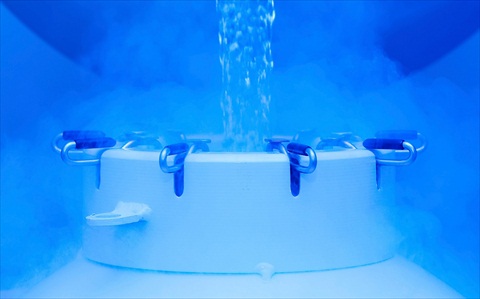Members Login

Channels
Special Offers & Promotions
Improved cryopreservation of human hepatocytes

A recently published article** from researchers at the Karolinska Institute details an improved protocol for cryopreservation of primary human hepatocyte using STEM-CELLBANKER® cryopreservation solution from AMSBIO.
In the article the authors compare cryopreservation of liver hepatocytes using STEM-CELLBANKER with the frequently used DMSO-University of Wisconsin (DMSO-UW) medium protocol. Both protocols yielded hepatocytes with good P450 function, however, the STEM-CELLBANKER protocol gave a higher viability than the DMSO-UW cryoprotectant. The researchers concluded that STEM-CELLBANKER beneficially is also xeno-free and will be applicable to cryopreservation of clinical-grade primary human hepatocytes.
STEM-CELLBANKER from AMSBIO is a chemically defined freezing medium with optimized formulation for stem cells and iPS cells storage as well as other valuable cells. Supplied ready-to-use with a simple usage protocol, STEM-CELLBANKER is completely free of serum and animal derived components, and contains only European or US Pharmacopoeia graded ingredients. Part of the CELLBANKER® series of cell freezing media, STEM-CELLBANKER® significantly increases cell viability while maintaining cell pluripotency, normal karyotype and proliferation ability following resuscitation from cryopreservation, even after extended long-term storage. Every batch of STEM-CELLBANKER® cryopreservation medium is performance tested on Jurkat and SK-007 cells. Additional standard evaluations for endotoxins, pH, osmolarity and Mycoplasma contaminants are undertaken to ensure GMP equivalent quality.
For further information on STEM-CELLBANKER please click here or contact AMSBIO on +44-1235-828200 / +1-949-768-8365 or email info@amsbio.com.
Founded in 1987, AMS Biotechnology (AMSBIO) is recognised as a leading international provider of unique, innovative products & custom services for life sciences research. The AMSBIO range includes over 23,000 polyclonal & monoclonal antibodies, peptides, recombinant proteins, extracellular matrix, molecular detection reagents, & tissue DNA, RNA, protein & microarray products. Key research areas include: apoptosis, cell invasion & migration, cell signaling, DNA damage, 3D culture, electrophoresis, glycobiology, post-translational modification & stem cell biology.
** World Journal of Hepatology 2012, May 27th, 4 (5), pp. 176-183 : Mohammed Saliem et al Karolinska Institute, Sweden
Media Partners


